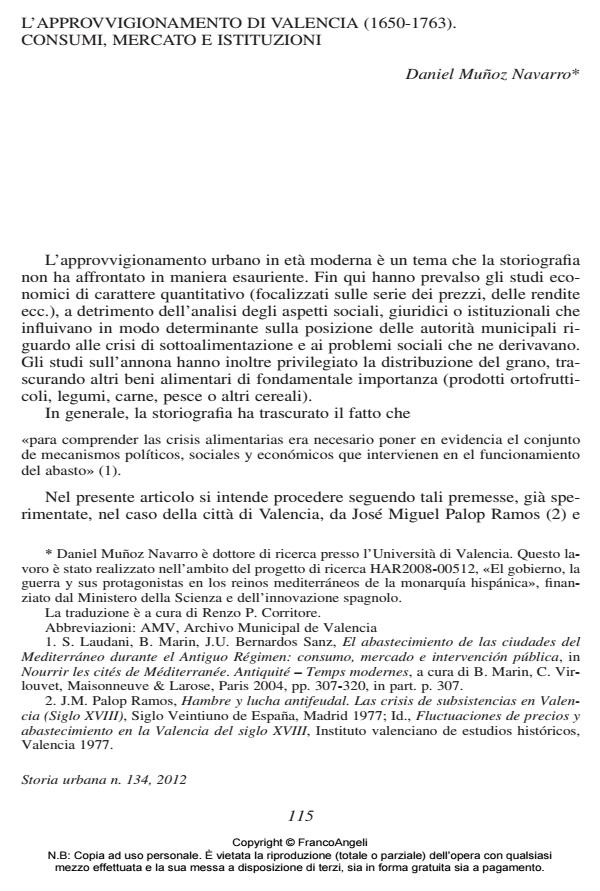Provisioning Valencia, 1650-1763. Consumption, market and institutions Provisioning Feeding Market
Journal title STORIA URBANA
Author/s Daniel Munoz Navarro
Publishing Year 2012 Issue 2012/134
Language Italian Pages 17 P. 115-131 File size 490 KB
DOI 10.3280/SU2012-134007
DOI is like a bar code for intellectual property: to have more infomation
click here
Below, you can see the article first page
If you want to buy this article in PDF format, you can do it, following the instructions to buy download credits

FrancoAngeli is member of Publishers International Linking Association, Inc (PILA), a not-for-profit association which run the CrossRef service enabling links to and from online scholarly content.
Valencia, 17th-18th century This article examines the supply of victuals in Valencia between 1650 and 1763, through the study of orders of «buen gobierno», issued in this period by the local authorities. Especially noteworthy is the presence of foods such as fruits, vegetables, meat, fish and cheese, among others. This is a contrast to conventional studies on the diet of the ancient regime, which have focused solely on the supply of wheat. This study is based on legal sources, the orders of good governance issued by the municipal authorities. Based on this documentation we propose a methodology that uses analysis of social, institutional and legal factors to complement the classic studies, which tend to be excessively quantitative. What we demonstrate is the existence of a more varied diet than older studies indicated, the increasing difficulty of supply in Valencia throughout the first half of eighteenth century, the role that resellers played in this instability and the inability of the authorities and the supply systems to adapt to the new situation. In conclusion, we suggest the need for methodologically more complex studies on supplying future research.
Alimentazione Mercato Valencia, secc. XVII-XVIII Il lavoro si propone di analizzare l’approvvigionamento alimentare di Valencia fra il 1650 e il 1763, attraverso lo studio degli «autos de buen gobierno» emanati dalle autorità municipali in quel lasso di tempo. In tal modo si vuole abbandonare l’approccio tradizionale incentrato quasi esclusivamente sull’annona frumentaria, per affermare l’importanza durante l’ancien régime anche di altri consumi alimentari, per esempio di frutta, verdura, carne, pesce e formaggio. La documentazione utilizzata è di natura giuridica, gli autos de buen gobierno promulgati dalle autorità municipali, in virtù dei quali è possibile affrancarsi dall’impostazione eccessivamente quantitativa degli studi tradizionali a favore di un approccio più attento agli aspetti qualitativi e all’analisi delle componenti sociali, istituzionali e giuridiche. Alla luce di tale documentazione è comprovata la minor dipendenza dal frumento dei consumi valenciani e la sussistenza di una dieta più variegata rispetto a quanto contemplato dagli studi tradizionali, ma anche l’aggravarsi dei problemi annonari della città nella prima metà del secolo XVIII. Si palesa così la responsabilità del commercio speculativo in tale squilibrio, così come l’incapacità delle autorità e del sistema annonario di far fronte ai nuovi bisogni della città nel ’700. In tema di approvvigionamento alimentare è necessario quindi perseguire una prospettiva di analisi più complessa, sul piano metodologico ed euristico, per ottenere risultati più solidi e veritieri.
- LAS MUJERES DEL MERCADO. ABASTO, EMPRENDIMIENTO Y TRABAJO FEMENINO EN LA VALENCIA DEL SIGLO XVIII Daniel Muñoz Navarro, in Ohm : Obradoiro de Historia Moderna /2023
DOI: 10.15304/ohm.32.8731
Daniel Munoz Navarro, L’approvvigionamento di Valencia (1650-1763). Consumi, mercato e istituzioni in "STORIA URBANA " 134/2012, pp 115-131, DOI: 10.3280/SU2012-134007